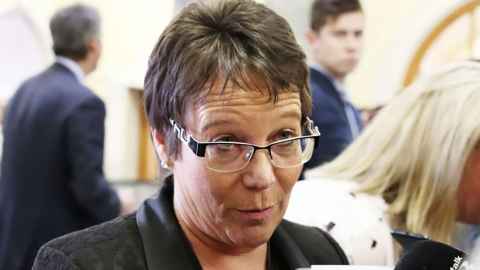When you’re in a hole, stop digging
8 July 2020
Opinion: The incoming government needs to wake up and have a critical look at the child protection monster that is Oranga Tamariki, writes Ian Hyslop.

There is always risk of a chronic disconnect between the policy and operational arms of public service organisations. This risk is particularly acute in excessively centralised organisations.
Under the watch of Grainne Moss, the state child protection agency Oranga Tamariki has become an increasingly bloated and impenetrable bureaucracy. A lot of time, energy and money goes into generating advice, scoping big picture ideas and adhering to obscure managerial imperatives like keeping the runways clear.
There is a place for centralised planning and service development, but this needs to be genuinely consultative and community-informed. What we have seen is the assembly and locking down of battleship OT, complete with corporate wardrobe and secret codes.
The ‘new’ organisation was born of a flawed reform process, driven by then Minister Anne Tolley, which assumed the need for child rescue to prevent intergenerational abuse. The appointment of Moss and a plethora of managers with little or no idea about child protection social work is inextricably tied with this narrative.
Minister for Children Tracey Martin seems to have imbibed a lethal dose of corporate spin and does not appear to be capable of grasping the bigger picture of child protection reform.
This direction and the social investment reform plan that went with it was significantly blunted by a range of oppositional forces, especially from within the Māori community. A modified reform agenda and, in part at least, a modified legislative framework has emerged. This calls for the development of meaningful service devolution to Hapu/Iwi Māori.
Moss was employed to pilot a much different waka and is not well-suited to this kaupapa. Similarly, Minister for Children Tracey Martin seems to have imbibed a lethal dose of corporate spin and does not appear to be capable of grasping the bigger picture of child protection reform.
I am the first to admit that child protection work is challenging and that innocent children need to be protected from harm. This is not the debate at hand. The debate is about how this can best be done. OT behaves like a corporate organisation, albeit a clumsy and top-heavy one. It doesn’t behave like a social work organisation. Decent social work organisations focus on the health and wellbeing of their workers. Decades of child protection system reviews, here and overseas, tell us this.
The work is demanding, decisions are not straight-forward, information is imperfect, time is short, workers are human, risk aversion can stifle good practice and recording systems based on productivity measurement are not fit-for-purpose. Child protection workers can feel under siege and criticised from all angles. What workers need is the opportunity to openly process these difficulties: express doubts, recognise anxiety and uncertainty, acknowledge the emotional labour they are engaged in. They need to be given time to breathe, think, reflect and – yes – to challenge organisational systems that don’t work for them or the children and families they work with.
You can't run a professional service by intimidation. To get the best practice outcomes you need to let your staff speak and think and nurture their practice skills because that is how the work is done - by skilled and careful communicative engagement. Cultures of toughness and silence and rewards for not rocking the boat, not spoiling the Wellington fantasy, lead not only to broken dreams, but also to broken whānau.
The incoming government needs to wake up and have a critical look at the child protection monster. Regurgitating OT propaganda is not enough. We need a quantum shift. When in a hole, best to stop digging. I am tired of watching this train-wreck.
Dr Ian Hyslop is a senior lecturer in the School of Counselling, Human Services and Social Work, Faculty of Education and Social Work. He worked for 20 years as a social worker, supervisor, and practice manager in statutory child protection practice in Auckland.
This article reflects the opinion of the author and not necessarily the views of the University of Auckland.
Used with permission from Newsroom When you’re in a hole, stop digging 8 July 2020.
Media queries
Alison Sims | Research Communications Editor
DDI 09 923 4953
Mob 021 249 0089
Email alison.sims@auckland.ac.nz